Unit 9 Can you come to my party?Section A (1a-2d) 课件 (共43张PPT,无素材)
文档属性
| 名称 | Unit 9 Can you come to my party?Section A (1a-2d) 课件 (共43张PPT,无素材) |  | |
| 格式 | pptx | ||
| 文件大小 | 37.9MB | ||
| 资源类型 | 教案 | ||
| 版本资源 | 人教新目标(Go for it)版 | ||
| 科目 | 英语 | ||
| 更新时间 | 2023-12-24 09:24:25 | ||
图片预览

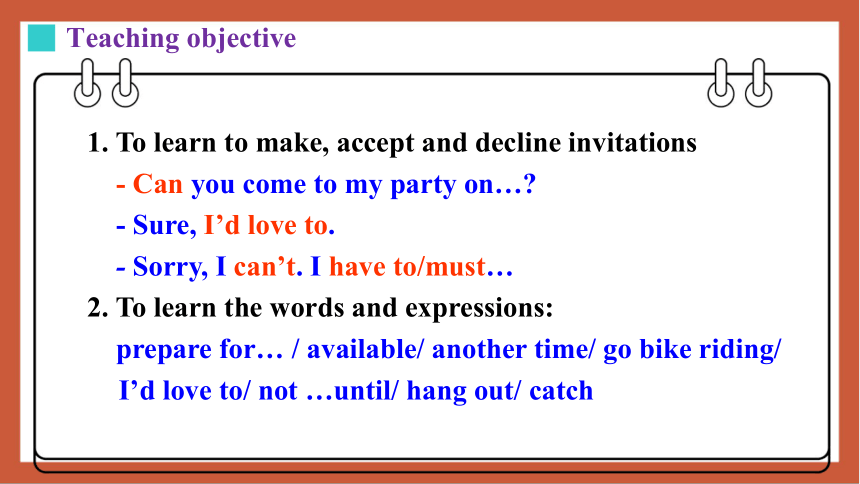
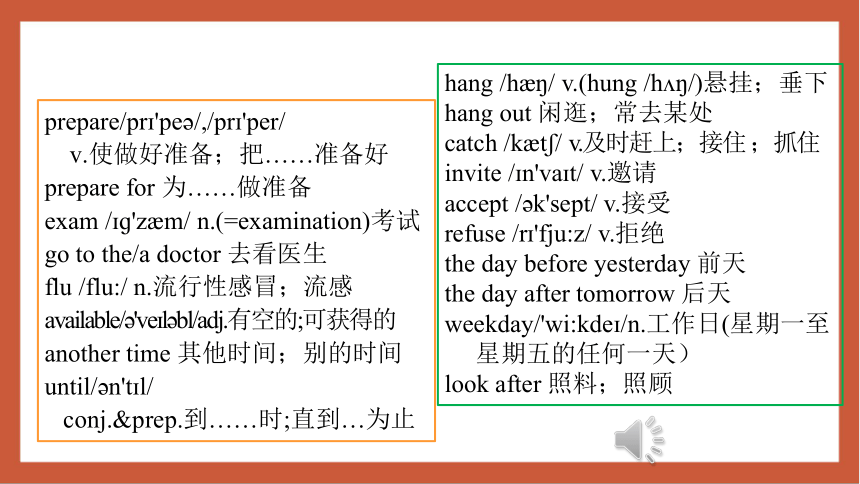

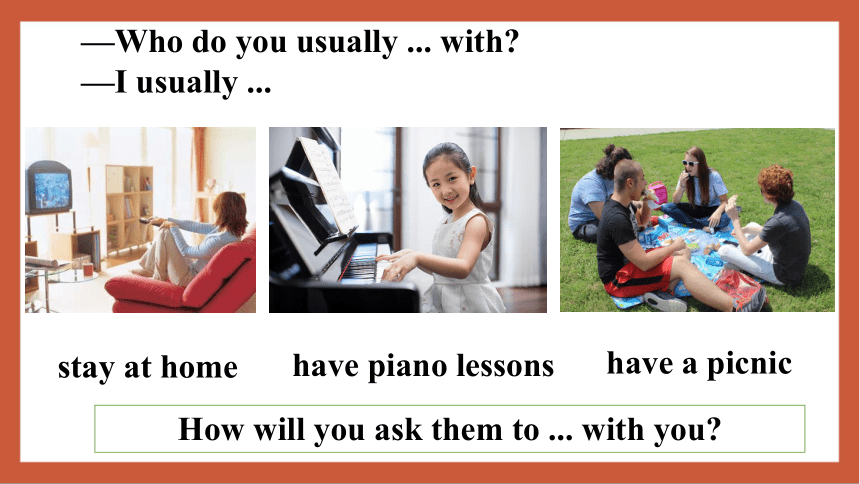

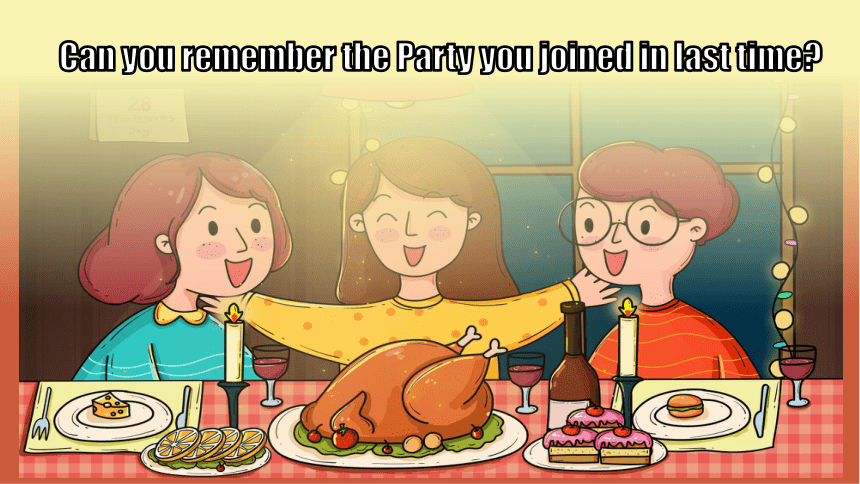
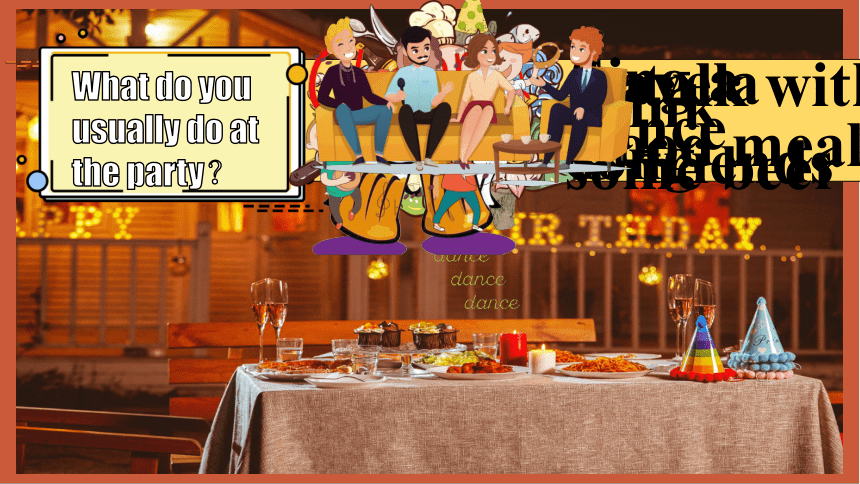
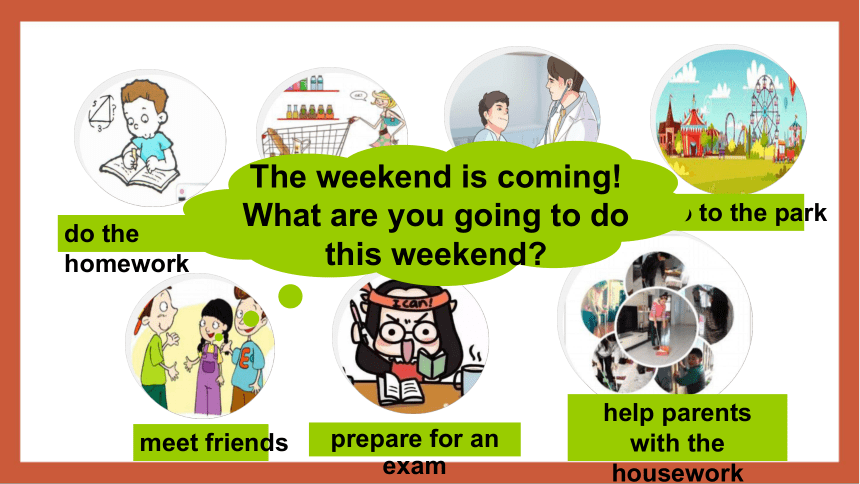
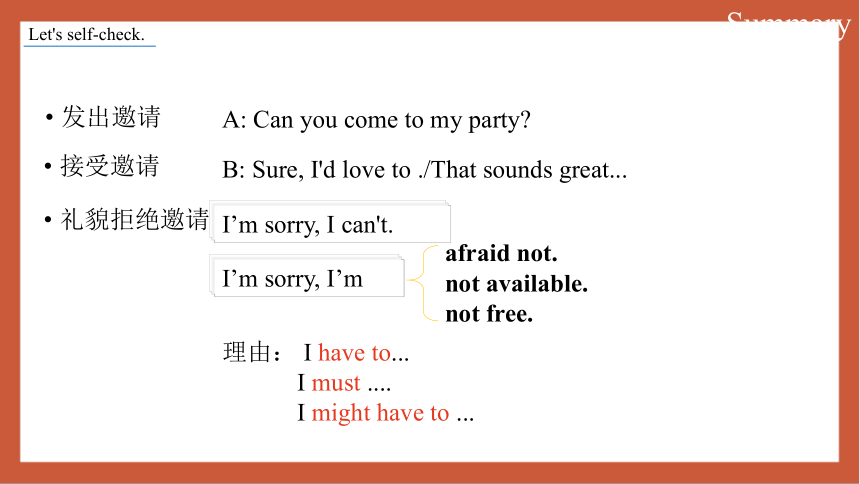
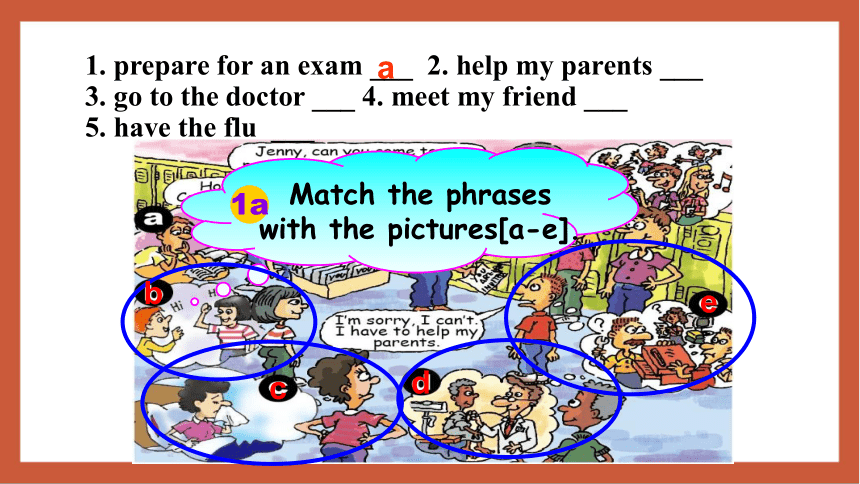
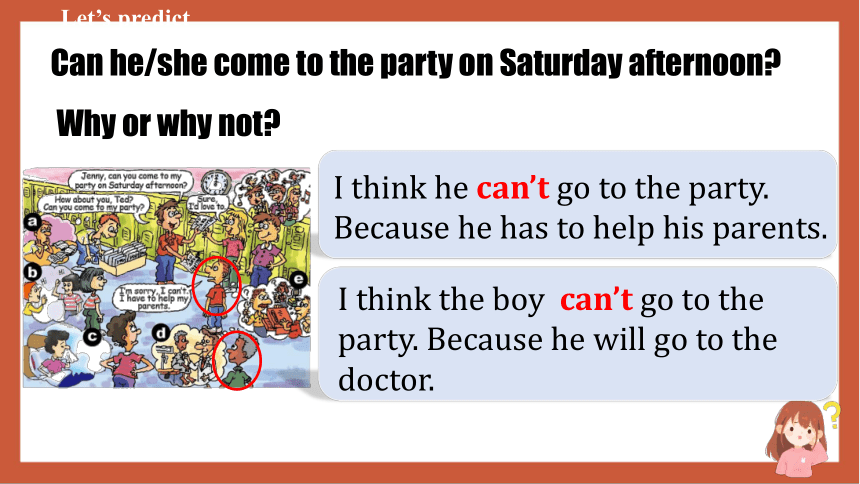
文档简介
(共43张PPT)
Unit 9
Can you come to my party
Section A (1a-2d)
1. To learn to make, accept and decline invitations
- Can you come to my party on…
- Sure, I’d love to.
- Sorry, I can’t. I have to/must…
2. To learn the words and expressions:
prepare for… / available/ another time/ go bike riding/
I’d love to/ not …until/ hang out/ catch
hang /h / v.(hung /h /)悬挂;垂下
hang out 闲逛;常去某处
catch /k t / v.及时赶上;接住 ;抓住
invite / n'va t/ v.邀请
accept / k'sept/ v.接受
refuse /r 'fju:z/ v.拒绝
the day before yesterday 前天
the day after tomorrow 后天
weekday/'wi:kde /n.工作日(星期一至星期五的任何一天)
look after 照料;照顾
prepare/pr 'pe /,/pr 'per/
v.使做好准备;把……准备好
prepare for 为……做准备
exam / ɡ'z m/ n.(=examination)考试
go to the/a doctor 去看医生
flu /flu:/ n.流行性感冒;流感
available/ 've l bl/adj.有空的;可获得的
another time 其他时间;别的时间
until/ n't l/
conj.&prep.到……时;直到…为止
Lead-in
—What do you usually do when you are free
— I usually ...
go shopping
play computer games
watch movies
stay at home
have piano lessons
have a picnic
—Who do you usually ... with
—I usually ...
How will you ask them to ... with you
Check the answers!
备考
感冒
见朋友
上吉他课
做作业
照顾弟弟
看医生
帮助父母
去图书馆
去公园
去购物
做家务
prepare for an exam
have the flu
meet my friends
take the guitar lessons
do my homework
take care of my brother
go to the doctor
help with my parents
go to the library
go to the park
go shopping
do housework
Can you remember the Party you joined in last time
What do you usually do at the party?
dance
have a good meal
drink some beer
Sing a song
talk with friends
do the homework
go shopping
go to the doctor
go to the park
help parents
with the housework
meet friends
prepare for an exam
The weekend is coming! What are you going to do this weekend
A: Can you come to my party
B: Sure, I'd love to ./That sounds great...
I’m sorry, I can't.
afraid not.
not available.
not free.
I’m sorry, I’m
理由: I have to...
I must ....
I might have to ...
Summary
Let's self-check.
接受邀请
发出邀请
礼貌拒绝邀请
1. prepare for an exam ___ 2. help my parents ___
3. go to the doctor ___ 4. meet my friend ___
5. have the flu ___
d
c
a
1a
Match the phrases
with the pictures[a-e].
b
e
Let’s predict
Can he/she come to the party on Saturday afternoon
Why or why not
I think he can’t go to the party. Because he has to help his parents.
I think the boy can’t go to the party. Because he will go to the
doctor.
1b
Listen and write the names (Tim, Kay, Anna and
Wilson) next to the correct students in the picture.
Tim
Anna
Kay
Wilson
Listen again and finish the chart.
Name Can/Can't come to Sun Ning's party Reasons
Ted
Jenny
Tim
Wilson
Anna
Kay
can't
has to help his parents
can
/
can't
has to prepare for an exam
can't
must go to the doctor
can't
might have to meet her friend
can't
has the flu
Pay attention to the following expressions!
Translate the expressions into Chinese!
为考试做准备
去看医生
见我的朋友
得了流感
拒绝邀请:(可附加不去的原因)
I'm sorry, I can't. I have to…
Oh,no,I can't. I might have to…
Sorry, I must…
I can’t either. I…
接受邀请
发出邀请
Sun Ning’s party
Retell the conversation with the help of the mind map.
You can start like this: Ted can’t go to ...
Ted
can’t
Jenny
can
Tim
can’t
Wilson
can’t
Anna
can’t
Kay
can’t
might
must
Sun Ning: Hey, Ted. Can you come to my party on Saturday afternoon
Ted: I’m sorry, I can’t, Sun Ning. I have to help my parents.
Sun Ning: Too bad. How about you, Jenny Can you come to my party
Jenny: I’d love to.
Sun Ning: Tim What about you
Tim: When is it
Sun Ning: Saturday afternoon.
Tim: Oh, no, I can’t. I have to prepare for an exam.
Sun Ning: What about you, Wilson
Wilson: Sorry, I must go to the doctor.
Sun Ning: Anna, can you come
Anna: I can’t, Sun Ning. I might have to meet my friend.
Kay: I can’t either, Sun Ning. I have the flu.
Sun Ning : That’s too bad, Kay. Oh, maybe next time. What a small party!
Read and repeat
1c Role-play the conversation.
Sure, I’d love to
That sounds great!
Of course I can
It’s my pleasure!
Sorry, I can’t, I have to…
Sorry, I am afraid not, I must …
Sorry, I am not available/free.
Can you come to my party on Saturday afternoon
……
……
……
A: Can you come to my party on
Saturday afternoon
B: Sure, I’d love to.
C: Sorry, I can’t. I have to prepare
for an exam.
D: I’m sorry, too. I must go to the doctor.
You are the students in the picture. Student A, invite three students to your party. Student B, C and D, give answers.
1c
Can you…
A:Can you come to my party
B:I’m sorry. I have to help my mom.
A: Can you play tennis
B: Sure,I’d love to.
A: Can you come to my party
B: Sure,I’d love to.
A:Can you go to the mall
B:I’m sorry. I’m going to the movies.
重点短语
重点句型
1. —Can you come to my party on Saturday
“周六你能来参加我的聚会吗 ”
—Sure, I'd love to. “当然,我想来。”
—Sorry, I can't. I have to prepare for an exam.
抱歉,我不能来,我得为考试做准备
1.prepare for 为……做准备
2.go to the/a doctor 去看医生
How to make an invitation
Can you come to my birthday
Could you come to my school
How to accept an invitation
Yes/Certainly/Sure, I’d love / like to.
How to decline an invitation
I’m sorry, I can’t. I have to…
I’d love to, but I have to…
Sorry, I can’t. I’m going to the movies.
2a
Listen and circle can or can’t.
1. Jeff can/ can’t go to the party.
2. Mary can/ can’t go to the party.
3. May can/ can’t go to the party.
4. Mei Ling can/ can’t go to the party.
5. Paul can/ can’t go to the party.
2b Listen again. Who can’t go to the party Why Complete the chart.
Names
Reasons
Jeff
May
Mei Ling
He has to meet his friend on Saturday.
She has a flu
She has to study for her math test
2c Look at the reasons on the chart in 2b. Write some more. Then, Student A, invite your partner to do something. Student B, say you can’t go and why.
1. Too much homework 2._____________________________3._____________________________4._____________________________
A: Hey, Dave. Can you go to the movies on Saturday
B: I’m sorry, I’m not available. I have too much homework this weekend.
A: That’s too bad. Maybe another time.
B: Sure, Joe. Thanks for asking.
2d. Translate the underlined sentences.
Jeff: Hey, Nick, can you come to my house on Saturday My cousin Sam from Xi’an is going to be here.
Nick: Oh, Sam! I remember we went bike riding together last fall when he visited you.
Jeff: Yes, that’s right.
Nick: I’d love to come, but I’m afraid I can’t. I have an exam on Monday so I must prepare for it.
Jeff: That’s really too bad! Oh, but Sam isn’t leaving until next Wednesday. Can you hang out with us on Monday night
Nick: Sure! Catch you on Monday!
我记得去年秋天他来看你时我们一起去骑了自行车。
我周一有一个考试,所以我必须准备一下。
New Year’s Day is coming.I will have a New Year’s Party at home. Can you come to my party
Yes, I’d love to.
Sorry, I have to...
If you want to invite (邀请) your friends to your birthday party, what should you say
make invitations
invite[ n va t] v.邀请
invitation[ nv te n]
n.邀请;请柬;请帖
Can you come to my party
Would you like to come to my party
Would you love to come to my party
1. prepare for an exam
prepare for 为……做准备
I have to prepare for next week’s speech contest.
prepare 的其他用法:
① prepare sb. sth.=prepare sth. for sb. 为某人准备某物
② prepare to do sth. 准备做某事
Language Points
I have an exam on Monday so I must prepare for it.
我周一有一个考试,所以我必须准备一下
表示“准备做某事”。
例如:He is preparing to go on a trip. 他正准备去旅行。
prepare sth.
意为“准备……”,宾语是所准备的内容。
例如:Mother was preparing dinner in the kitchen. 妈妈在厨房准备饭菜。
prepare作动词,意为“准备”。其用法归纳如下:
2) prepare to do sth.
【语境应用】完成句子。
1) 我们正在努力工作,为会议做准备。
We are working hard to _____________________.
2) 我准备写一些关于我旅行的事。
______________________ write something about my trip.
3) 当你去香港时,我正忙着准备期末考试。
While you were on the visit to Hong Kong, I was busy ______________________ my final exams.
prepare for the meeting
I prepare to
preparing for
exam n. 考试
exam做可数名词,是examination的简写形式。前面用不定冠词修饰时,应用an,相关短语有:
2. go to the doctor(教材P65 1a)
go to the/a doctor 相当于 go to see the doctor。
He is going to the doctor because of a headache.
go to the/a doctor 去看医生
Language Points
2. Can you hang out with us on Monday night 你能在周一晚上和我们逛逛吗?
hang (v),闲逛,悬挂,过去式为hung,常见搭配有:
hang out 闲逛
hang about 闲逛
hang on 紧紧抓住
hang up 挂断电话
也可以表示“上吊,绞死”,过去式为hanged.
规规矩矩上吊,乱七八糟挂衣服
点钟
年
日期
上午;下午或晚上
星期
月
季节
morning
afternoon
易混词 用法 例子
at 常用于______前或固定短语中 在九点____________
在中午____________
在夜晚____________
on 用在______和______前,也可用于具体某一天的_________________前 在6月11日____________
在星期五____________
在星期天上午____________
in 用在____;____和_____前,也 可和_________;_________和_________搭配 在晚上____________
在七月____________
在冬天____________
在2019年____________
evening
at nine
at noon
at night
on June 11th
on Friday
on Sunday morning
in July
in the evening
in winter
in 2019
3. have the flu
此处have表示“患病”的意思。类似的短语还有:
have the flu 患流感
4. Oh, but Sam isn’t leaving until next Wednesday.
哦,但是萨姆要一直待到下周三才会走。
until prep. 到……时;直到……为止
相当于till。
e.g. Go down the street until you see the bank.
一直走,直到你看见银行。
not … until … 直到……才…… 句中谓语动词常为非延续性动词,指until所表示的时间到了,该动作才发生。在肯定句中,谓语动词常为延续性动词,表示该动作一直持续到until所表示的时间为止。
5. I have to help my parents.
我必须给父母帮忙。
have to 表示客观需要,意为 “必须,不得不”。
1) It’s late. I have to go.
天色不早了,我得走了。
2) She had to look after her sick mother yesterday.
她昨天不得不照顾生病的妈妈。
Exercises
一、单项选择。
1. He ___ stay at home, because his mother was ill.
A. has to B. have to C. had D. had to
2. I went to the mountain _____.
A. next week B. the day after tomorrow
C. yesterday D. tomorrow
4. Would you please ____me ____ the housework
A. help, in B. to help, with
C. help, doing D. help, do
D
C
D
1. This evening I’m studying for the math e_______.
2. Mr. Li is a__________ in the afternoon, and you can meet him then.
3. Look! My mom is p________ for the dinner in the kitchen.
4. They didn’t ______ (赶上) the last bus, so they took a taxi home.
5. I don’t feel very well today. I’m afraid I have the _____ (流感).
二、单词填空
xam
vailable
reparing
catch
flu
II.单项填空
6.There is a train at 6:30 p.m. If you run, you'll ________ it.( )
B
A. miss B. catch C. get D. arrive
7.—Can you go to the concert with me, Dad
—________( )
C
A. You're welcome. B. What a pity!
C. Sure, I'd love to. D. Thanks!
8.Before you get off the bus, you should wait ________ it has stopped.( )
A
A. until B. but C. because D. so
9.My classmate is running so fast! I ________ believe my eyes.( )
A
A. can't B. needn't C. mustn't D. shouldn't
Use what you have learned in this lesson to make up a new conversation among three people. One makes an invitation, the second person accepts it and the third person turns down it.
Unit 9
Can you come to my party
Section A (1a-2d)
1. To learn to make, accept and decline invitations
- Can you come to my party on…
- Sure, I’d love to.
- Sorry, I can’t. I have to/must…
2. To learn the words and expressions:
prepare for… / available/ another time/ go bike riding/
I’d love to/ not …until/ hang out/ catch
hang /h / v.(hung /h /)悬挂;垂下
hang out 闲逛;常去某处
catch /k t / v.及时赶上;接住 ;抓住
invite / n'va t/ v.邀请
accept / k'sept/ v.接受
refuse /r 'fju:z/ v.拒绝
the day before yesterday 前天
the day after tomorrow 后天
weekday/'wi:kde /n.工作日(星期一至星期五的任何一天)
look after 照料;照顾
prepare/pr 'pe /,/pr 'per/
v.使做好准备;把……准备好
prepare for 为……做准备
exam / ɡ'z m/ n.(=examination)考试
go to the/a doctor 去看医生
flu /flu:/ n.流行性感冒;流感
available/ 've l bl/adj.有空的;可获得的
another time 其他时间;别的时间
until/ n't l/
conj.&prep.到……时;直到…为止
Lead-in
—What do you usually do when you are free
— I usually ...
go shopping
play computer games
watch movies
stay at home
have piano lessons
have a picnic
—Who do you usually ... with
—I usually ...
How will you ask them to ... with you
Check the answers!
备考
感冒
见朋友
上吉他课
做作业
照顾弟弟
看医生
帮助父母
去图书馆
去公园
去购物
做家务
prepare for an exam
have the flu
meet my friends
take the guitar lessons
do my homework
take care of my brother
go to the doctor
help with my parents
go to the library
go to the park
go shopping
do housework
Can you remember the Party you joined in last time
What do you usually do at the party?
dance
have a good meal
drink some beer
Sing a song
talk with friends
do the homework
go shopping
go to the doctor
go to the park
help parents
with the housework
meet friends
prepare for an exam
The weekend is coming! What are you going to do this weekend
A: Can you come to my party
B: Sure, I'd love to ./That sounds great...
I’m sorry, I can't.
afraid not.
not available.
not free.
I’m sorry, I’m
理由: I have to...
I must ....
I might have to ...
Summary
Let's self-check.
接受邀请
发出邀请
礼貌拒绝邀请
1. prepare for an exam ___ 2. help my parents ___
3. go to the doctor ___ 4. meet my friend ___
5. have the flu ___
d
c
a
1a
Match the phrases
with the pictures[a-e].
b
e
Let’s predict
Can he/she come to the party on Saturday afternoon
Why or why not
I think he can’t go to the party. Because he has to help his parents.
I think the boy can’t go to the party. Because he will go to the
doctor.
1b
Listen and write the names (Tim, Kay, Anna and
Wilson) next to the correct students in the picture.
Tim
Anna
Kay
Wilson
Listen again and finish the chart.
Name Can/Can't come to Sun Ning's party Reasons
Ted
Jenny
Tim
Wilson
Anna
Kay
can't
has to help his parents
can
/
can't
has to prepare for an exam
can't
must go to the doctor
can't
might have to meet her friend
can't
has the flu
Pay attention to the following expressions!
Translate the expressions into Chinese!
为考试做准备
去看医生
见我的朋友
得了流感
拒绝邀请:(可附加不去的原因)
I'm sorry, I can't. I have to…
Oh,no,I can't. I might have to…
Sorry, I must…
I can’t either. I…
接受邀请
发出邀请
Sun Ning’s party
Retell the conversation with the help of the mind map.
You can start like this: Ted can’t go to ...
Ted
can’t
Jenny
can
Tim
can’t
Wilson
can’t
Anna
can’t
Kay
can’t
might
must
Sun Ning: Hey, Ted. Can you come to my party on Saturday afternoon
Ted: I’m sorry, I can’t, Sun Ning. I have to help my parents.
Sun Ning: Too bad. How about you, Jenny Can you come to my party
Jenny: I’d love to.
Sun Ning: Tim What about you
Tim: When is it
Sun Ning: Saturday afternoon.
Tim: Oh, no, I can’t. I have to prepare for an exam.
Sun Ning: What about you, Wilson
Wilson: Sorry, I must go to the doctor.
Sun Ning: Anna, can you come
Anna: I can’t, Sun Ning. I might have to meet my friend.
Kay: I can’t either, Sun Ning. I have the flu.
Sun Ning : That’s too bad, Kay. Oh, maybe next time. What a small party!
Read and repeat
1c Role-play the conversation.
Sure, I’d love to
That sounds great!
Of course I can
It’s my pleasure!
Sorry, I can’t, I have to…
Sorry, I am afraid not, I must …
Sorry, I am not available/free.
Can you come to my party on Saturday afternoon
……
……
……
A: Can you come to my party on
Saturday afternoon
B: Sure, I’d love to.
C: Sorry, I can’t. I have to prepare
for an exam.
D: I’m sorry, too. I must go to the doctor.
You are the students in the picture. Student A, invite three students to your party. Student B, C and D, give answers.
1c
Can you…
A:Can you come to my party
B:I’m sorry. I have to help my mom.
A: Can you play tennis
B: Sure,I’d love to.
A: Can you come to my party
B: Sure,I’d love to.
A:Can you go to the mall
B:I’m sorry. I’m going to the movies.
重点短语
重点句型
1. —Can you come to my party on Saturday
“周六你能来参加我的聚会吗 ”
—Sure, I'd love to. “当然,我想来。”
—Sorry, I can't. I have to prepare for an exam.
抱歉,我不能来,我得为考试做准备
1.prepare for 为……做准备
2.go to the/a doctor 去看医生
How to make an invitation
Can you come to my birthday
Could you come to my school
How to accept an invitation
Yes/Certainly/Sure, I’d love / like to.
How to decline an invitation
I’m sorry, I can’t. I have to…
I’d love to, but I have to…
Sorry, I can’t. I’m going to the movies.
2a
Listen and circle can or can’t.
1. Jeff can/ can’t go to the party.
2. Mary can/ can’t go to the party.
3. May can/ can’t go to the party.
4. Mei Ling can/ can’t go to the party.
5. Paul can/ can’t go to the party.
2b Listen again. Who can’t go to the party Why Complete the chart.
Names
Reasons
Jeff
May
Mei Ling
He has to meet his friend on Saturday.
She has a flu
She has to study for her math test
2c Look at the reasons on the chart in 2b. Write some more. Then, Student A, invite your partner to do something. Student B, say you can’t go and why.
1. Too much homework 2._____________________________3._____________________________4._____________________________
A: Hey, Dave. Can you go to the movies on Saturday
B: I’m sorry, I’m not available. I have too much homework this weekend.
A: That’s too bad. Maybe another time.
B: Sure, Joe. Thanks for asking.
2d. Translate the underlined sentences.
Jeff: Hey, Nick, can you come to my house on Saturday My cousin Sam from Xi’an is going to be here.
Nick: Oh, Sam! I remember we went bike riding together last fall when he visited you.
Jeff: Yes, that’s right.
Nick: I’d love to come, but I’m afraid I can’t. I have an exam on Monday so I must prepare for it.
Jeff: That’s really too bad! Oh, but Sam isn’t leaving until next Wednesday. Can you hang out with us on Monday night
Nick: Sure! Catch you on Monday!
我记得去年秋天他来看你时我们一起去骑了自行车。
我周一有一个考试,所以我必须准备一下。
New Year’s Day is coming.I will have a New Year’s Party at home. Can you come to my party
Yes, I’d love to.
Sorry, I have to...
If you want to invite (邀请) your friends to your birthday party, what should you say
make invitations
invite[ n va t] v.邀请
invitation[ nv te n]
n.邀请;请柬;请帖
Can you come to my party
Would you like to come to my party
Would you love to come to my party
1. prepare for an exam
prepare for 为……做准备
I have to prepare for next week’s speech contest.
prepare 的其他用法:
① prepare sb. sth.=prepare sth. for sb. 为某人准备某物
② prepare to do sth. 准备做某事
Language Points
I have an exam on Monday so I must prepare for it.
我周一有一个考试,所以我必须准备一下
表示“准备做某事”。
例如:He is preparing to go on a trip. 他正准备去旅行。
prepare sth.
意为“准备……”,宾语是所准备的内容。
例如:Mother was preparing dinner in the kitchen. 妈妈在厨房准备饭菜。
prepare作动词,意为“准备”。其用法归纳如下:
2) prepare to do sth.
【语境应用】完成句子。
1) 我们正在努力工作,为会议做准备。
We are working hard to _____________________.
2) 我准备写一些关于我旅行的事。
______________________ write something about my trip.
3) 当你去香港时,我正忙着准备期末考试。
While you were on the visit to Hong Kong, I was busy ______________________ my final exams.
prepare for the meeting
I prepare to
preparing for
exam n. 考试
exam做可数名词,是examination的简写形式。前面用不定冠词修饰时,应用an,相关短语有:
2. go to the doctor(教材P65 1a)
go to the/a doctor 相当于 go to see the doctor。
He is going to the doctor because of a headache.
go to the/a doctor 去看医生
Language Points
2. Can you hang out with us on Monday night 你能在周一晚上和我们逛逛吗?
hang (v),闲逛,悬挂,过去式为hung,常见搭配有:
hang out 闲逛
hang about 闲逛
hang on 紧紧抓住
hang up 挂断电话
也可以表示“上吊,绞死”,过去式为hanged.
规规矩矩上吊,乱七八糟挂衣服
点钟
年
日期
上午;下午或晚上
星期
月
季节
morning
afternoon
易混词 用法 例子
at 常用于______前或固定短语中 在九点____________
在中午____________
在夜晚____________
on 用在______和______前,也可用于具体某一天的_________________前 在6月11日____________
在星期五____________
在星期天上午____________
in 用在____;____和_____前,也 可和_________;_________和_________搭配 在晚上____________
在七月____________
在冬天____________
在2019年____________
evening
at nine
at noon
at night
on June 11th
on Friday
on Sunday morning
in July
in the evening
in winter
in 2019
3. have the flu
此处have表示“患病”的意思。类似的短语还有:
have the flu 患流感
4. Oh, but Sam isn’t leaving until next Wednesday.
哦,但是萨姆要一直待到下周三才会走。
until prep. 到……时;直到……为止
相当于till。
e.g. Go down the street until you see the bank.
一直走,直到你看见银行。
not … until … 直到……才…… 句中谓语动词常为非延续性动词,指until所表示的时间到了,该动作才发生。在肯定句中,谓语动词常为延续性动词,表示该动作一直持续到until所表示的时间为止。
5. I have to help my parents.
我必须给父母帮忙。
have to 表示客观需要,意为 “必须,不得不”。
1) It’s late. I have to go.
天色不早了,我得走了。
2) She had to look after her sick mother yesterday.
她昨天不得不照顾生病的妈妈。
Exercises
一、单项选择。
1. He ___ stay at home, because his mother was ill.
A. has to B. have to C. had D. had to
2. I went to the mountain _____.
A. next week B. the day after tomorrow
C. yesterday D. tomorrow
4. Would you please ____me ____ the housework
A. help, in B. to help, with
C. help, doing D. help, do
D
C
D
1. This evening I’m studying for the math e_______.
2. Mr. Li is a__________ in the afternoon, and you can meet him then.
3. Look! My mom is p________ for the dinner in the kitchen.
4. They didn’t ______ (赶上) the last bus, so they took a taxi home.
5. I don’t feel very well today. I’m afraid I have the _____ (流感).
二、单词填空
xam
vailable
reparing
catch
flu
II.单项填空
6.There is a train at 6:30 p.m. If you run, you'll ________ it.( )
B
A. miss B. catch C. get D. arrive
7.—Can you go to the concert with me, Dad
—________( )
C
A. You're welcome. B. What a pity!
C. Sure, I'd love to. D. Thanks!
8.Before you get off the bus, you should wait ________ it has stopped.( )
A
A. until B. but C. because D. so
9.My classmate is running so fast! I ________ believe my eyes.( )
A
A. can't B. needn't C. mustn't D. shouldn't
Use what you have learned in this lesson to make up a new conversation among three people. One makes an invitation, the second person accepts it and the third person turns down it.
同课章节目录
- Unit 1 Where did you go on vacation?
- Section A
- Section B
- Unit 2 How often do you exercise?
- Section A
- Section B
- Unit 3 I'm more outgoing than my sister.
- Section A
- Section B
- Unit 4 What's the best movie theater?
- Section A
- Section B
- Unit 5 Do you want to watch a game show?
- Section A
- Section B
- Unit 6 I'm going to study computer science.
- Section A
- Section B
- Unit 7 Will people have robots?
- Section A
- Section B
- Unit 8 How do you make a banana milk shake?
- Section A
- Section B
- Unit 9 Can you come to my party?
- Section A
- Section B
- Unit 10 If you go to the party, you'll have a grea
- Section A
- Section B
